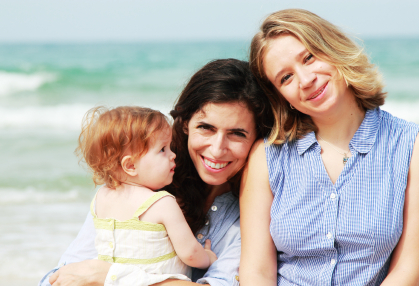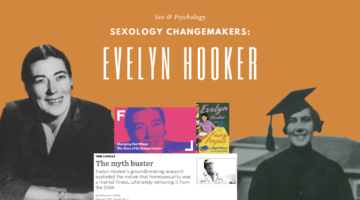Do Straight Couples Really Make Better Parents Than Gay Couples?
June 13, 2012 by Justin Lehmiller
Every time a new study comes out comparing the outcomes of children raised by same-sex and heterosexual couples, it garners a huge amount of media attention. It doesn’t matter what the actual findings are or whether the study is even of good quality—reporters, politicians, and activists take it as an opportunity to reignite the debate over whether a couple’s sexuality affects their parenting skills. In my view, such media reports are not only inconsequential, but they are also offensive and counterproductive. Let me explain.
1. There is no single, definitive study comparing gay and straight couples’ parenting skills. Every study has its own flaws and limitations and must be considered in the context of the larger body of research. The media does a great disservice to the public when it runs a sensationalized headline that highlights the results of just a single new study. All this creates is widespread confusion and misconceptions. For instance, in 2010, Time ran a story entitled “Study: Children of Lesbians May Do Better than Their Peers,” while just this week, Fox News ran an article entitled “Study Finds Host of Challenges for Kids of Gay Parents.” So which study should we believe and use to inform policy decisions?
Well, the 2010 study suggesting lesbians are better parents is rather small—it considers only 154 lesbians who underwent artificial insemination to start a family [1]. As a result, it is certainly not representative of all lesbian couples, nor can it speak to the parenting skills of gay men or same-sex couples who adopt. What about the more recent study suggesting that children of gay parents are “challenged?” That research has its own set of problems. In particular, most of the “same-sex couples” included in that study were actually male-female couples in which one of the partners came out after they had a child together [2]. So we’re not really talking about same-sex couples at all in this case; rather, we’re mostly talking about male-female couples who divorced or separated because one of them was actually gay. That’s a whole other matter entirely and saying that these relationships represent same-sex couples in general is disingenuous. Thus, we cannot look at just one study—we need to look at the broader pattern in the literature, which has consistently found that there’s usually no difference between children raised in same-sex and heterosexual households.
2. Media reports that try to persuade you that there is one “ideal” or “optimal” way to raise a child are offensive to all nontraditional families. The reality is that there is not a single parental arrangement that would universally benefit every child, and kids can be successful and well-adjusted growing up in all kinds of environments. The fact of the matter is that there are some excellent straight parents and some excellent gay parents—but at the same time, there are some awful straight parents and some awful gay parents. People who say that children are always better off with their two biological parents are, quite honestly, full of it. What if the biological parents don’t want the child? What if one of them is violent or abuses substances? What if they’re never home or aren’t emotionally supportive of their kids? Just because someone is heterosexual or biologically related to a child doesn’t automatically make them good parenting material. The thing that really matters is whether children are growing up in a stable, loving environment, and this is possible with a straight couple, a gay couple, a single parent, or any number of other arrangements.
3. The debate over who has superior parenting skills does nothing to help children who are actually in need, and it is a distraction from the real issues. Most research finds no difference, or only small differences between children raised by same-sex and heterosexual couples. In cases where differences are observed, it’s not like we’re talking about kids becoming CEOs vs. drug dealers—we’re usually only talking about relatively modest differences on measures of academic achievement and psychological well-being. And while these differences may be statistically significant, they aren’t necessarily all that meaningful or important in the real world. In other words, people in the media (and some scientists) frequently make the mistake of assuming that statistically significant differences always have practical significance. And even if we do discover that one parenting arrangement is slightly better than another, will that actually change anything for the kids?
In short, we would be better off if we ended the debate over who makes better parents because it is not taking us anywhere. Instead, the focus should be on how to make everyone–regardless of their sexuality and relationship status–better parents.
Want to learn more about Sex and Psychology? Click here for previous articles or follow the blog on Facebook (facebook.com/psychologyofsex), Twitter (@JustinLehmiller), or Reddit (reddit.com/r/psychologyofsex) to receive updates.
[1] Gartrell, N., & Bos, H. (2010). US National Longitudinal Lesbian Family Study: Psychological adjustment of 17-year-old adolescents. Pediatrics, 126, 1-9.
[2] Regnerus, M. (2012). How different are the adult children of parents who have same-sex relationships? Findings from the New Family Structures Study. Social Science Research, 41, 752-770.
Image Source: iStockphoto.com
Related Articles:

Dr. Justin Lehmiller
Founder & Owner of Sex and PsychologyDr. Justin Lehmiller is a social psychologist and Research Fellow at The Kinsey Institute. He runs the Sex and Psychology blog and podcast and is author of the popular book Tell Me What You Want. Dr. Lehmiller is an award-winning educator, and a prolific researcher who has published more than 50 academic works.
Read full bio >


